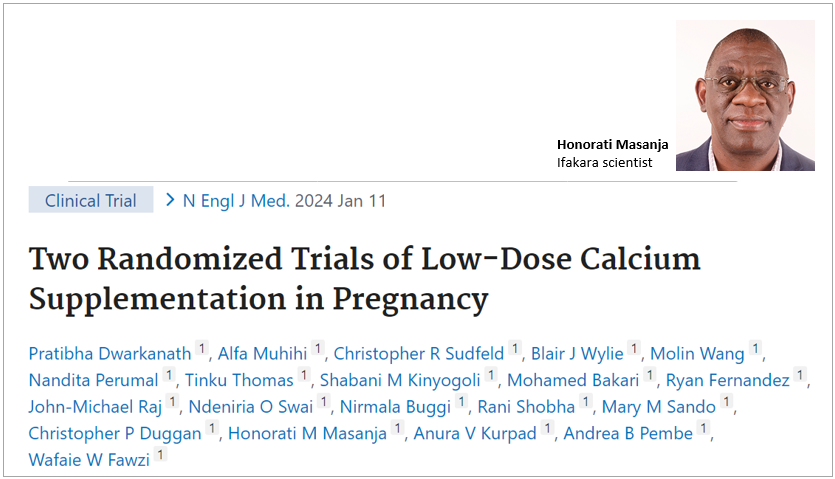
MATERNAL HEALTH: Trial finds low-dose calcium supplementation effective

A multi-center clinical trial has confirmed that low-dose calcium supplementation is effective and not inferior to the standard recommended high-dosing scheme in preventing preeclampsia, a condition characterized by high blood pressure during pregnancy which can be harmful to both mothers and newborns.
These fresh findings from separate trials conducted in India and Tanzania – published in the New England Journal of Medicine on January 14, 2024 – present a potential solution to the complexity of the current standard dosing scheme.
Scientists believe, these findings provide a more practical approach to improve maternal health and adopting it might be a more practical and cost-effective solution, reducing the burden of multiple pills and program costs significantly.
Ifakara Health Institute seasoned researcher, Dr. Honorati Masanja, contributed to the study, which was funded by the Bill and Melinda Gates Foundation and other partners, involving pregnant women enrolled at health clinics in Bangalore, India, and Dar es Salaam, Tanzania.
The trial enrolled expectant mothers who were at less than 20 weeks’ gestation (according to the date of the last menstrual period), who intended to stay in the trial area until 6 weeks post-partum, and who provided written informed consent. Women were excluded from enrollment if they had a history, signs, or symptoms of nephrolithiasis; had a history of parathyroid disorder or had undergone thyroidectomy; or had a disease for which digoxin, phenytoin, or tetracycline therapy was indicated.
WHO recommendation
The World Health Organization recommends 1500 to 2000 milligrams of calcium daily as supplementation, divided into three doses, for pregnant persons in populations with low dietary calcium intake to reduce the risk of preeclampsia. The complexity of the high-dosing scheme, however, has led to implementation barriers.
“Hypertensive disorders of pregnancy, which include preeclampsia, complicate 2 to 8% of pregnancies and are estimated to cause 45,000 maternal deaths annually. These disorders are also associated with an increased risk of preterm birth, the leading cause of death among children worldwide,” report the scientists in their paper.
Therefore, they say, implementation of effective strategies to prevent hypertensive disorders of pregnancy and preterm birth will be essential for countries to reach the maternal and child mortality targets of the United Nations Sustainable Development Goals by 2030.
Low-dose effective as high-dose
Carried out between 2018 and 2022, the two trials involved 22,000 first-time pregnant participants, with 11,000 from India and 11,000 from Tanzania. The scientists examined the outcomes of administering a 500 mg dose of calcium compared to the 1500 mg dose among the participants.
The results showed that the low-dose supplementation was as effective as the high-dose in preventing preeclampsia when the data from both trials were combined. However, for preventing preterm birth, the low-dose supplementation worked well in the India trial but did not show the same success in Tanzania.
“Overall, our findings in these two trials showed that low-dose calcium supplementation in pregnancy was non-inferior to high-dose supplementation with respect to the risk of preeclampsia. It was non-inferior with respect to the risk of preterm live births in the trial in India but not in the trial in Tanzania,” they conclude.
Since 2011, according to the WHO guidelines, pregnant women with low calcium intake are advised to follow a high-dose calcium supplementation, requiring calcium intake of four supplements daily. However, this new study suggests that adopting a low-dose supplementation regimen might be a more practical and cost-effective approach, reducing the burden of multiple pills and program costs significantly.
Impact of calcium intake
In the study, the scientists underscore that calcium supplementation can potentially reduce the risk of preeclampsia by lowering blood pressure and preventing uterine contractions. They also note the daily intake of a low-dose supplement (500 milligrams), can address the nutritional deficiencies of most pregnant women, particularly in low- and middle-income countries where diets may lack sufficient calcium.
Moreover, the scientists call for the adoption of effective strategies to address pregnancy-related issues, aiming to safeguard the health of both mothers and children.
Scientists behind the trial, publication
Ifakara Health Institute scientist, Dr. Masanja, contributed to the trial and publication along with colleagues from partner institutions in India, Tanzania, and the USA. The lead author was Dr. Pratibha Dwarkanath from St. John's Research Institute in India. Other contributors were Alfa Muhihi from Muhimbili Muhimbili University of Health and Allied Sciences in Tanzania, and Christopher Sudfeld and Wafaie Fawzi from the Harvard Medical School in Boston, United States.
Read full publication here.
